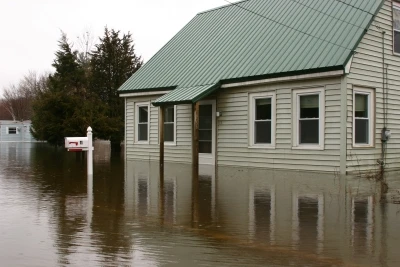What To Do After a Flash Flood
The unthinkable has occurred. Your home or business has been the casualty of a flash flood. What should you do? What happens next? While your questions and emotions surge as the water recedes, keep in mind that flash flood recovery, unlike its source, is not a here and gone endeavor…
Immediately following a flash flood:

- Stay tuned in.
During flash flood recovery, it is essential to listen to local radio, TV, or your weather radio for necessary information. Flood dangers may still be present even after the water has receded. These news outlets will keep you informed of when it is safe to return or venture out. - Assess utilities.
Turn off electrical if you see sparks, broken/frayed wires, or smell smoke/burning insulation. If you have to step in water to get to a fuse box or circuit breaker, consult an electrician for advice. If water or sewage lines have been damaged, consult a licensed plumber straightaway. If you smell natural gas or propane or hear a hissing noise, vacate the area immediately and contact the fire department. - Don’t drink the water.
Do not drink tap or well water until it is has been declared safe for consumption and free of human waste contamination, fuels, and other pollutants. Don’t use it to brush teeth, prepare food, wash dishes, make ice, or even wash your hands with it. Undamaged water heaters and melted ice cubes may offer a clean source of water to get you by. If you don’t have access to safe water:- Boil water:
Boil for one minute, then cool, storing in clean, covered containers. This will destroy most types of disease-causing microorganisms. - Bleach:
Bleach will kill some – but not all – types of bacteria. 1/8 teaspoon or eight drops of regular, unscented, liquid household bleach per gallon should be used. Let water stand 30 minutes before using.
- Boil water:
- Be overprotective.
Keep a close eye on children of all ages as well as pets. - Avoid flood-ravaged areas.
Barricades have been erected for your protection. Additional flooding may occur, roads may have been damaged, and an array of hazards – both visible and invisible – may be present. Staying off of roadways also helps emergency workers more easily get to flood victims in need of flash flood recovery. - Keep away from moving water.
Just six inches of moving water can knock you off your feet, and a couple of feet can carry away most vehicles. Avoid moving water at all costs. - If you must travel, use extreme caution.
Only travel through flood damaged areas when absolutely necessary. If you must travel, wait till water has stopped moving, wear sturdy shoes, and use a stick to gauge depth and firmness prior to taking each step. Be wary of contaminated water (gas, sewage, etc.), electrical hazards, hidden animals, dangerous debris, eroded roads and walkways, and more that can quickly land you in a dangerous situation whether you are traveling by foot or car. Avoid entering any structure surrounded by floodwaters that may be weakened until they have been declared safe from collapse.
Cleaning up and repairing:
- Disinfection protection.
Once floodwaters have receded, carefully clean and disinfect each wet item to protect your home and family from sewage or chemical contaminants. Be certain to wear protective clothing, including rubber gloves and boots, during cleanup activities. Not sure where to start? Depending on the amount of water damage in your home, carpet cleaning, upholstery cleaning and mold remediation will get your home looking and feeling like it should. - Floods and food.
Any items that have come in contact with floodwater should be thrown out. This includes bottled water, canned goods, plastic utensils, baby bottles, and more. When in doubt, throw it out! - Scammers and con artists.
Hire only professional, reputable contractors for cleanup and repair needs. Avoid the “drive-by” contractor. - Safe drainage.
Should your basement become flooded, drain it gradually – about 1/3 per day – to prevent structurally damage and collapse that may result from rapid water removal. - Insurance claims.
Contact your insurance agents to discuss flash flood recovery claims. The typical homeowner’s insurance policy does not cover flood damage. Call to verify coverage before flash flooding – and the need to file a claim – affects you. - Need help?
Stay tuned to your TV or radio during flash flood recovery for information on assistance available in your area through government or other organizations.



 Back
Back

 1 (855) 217-8437
1 (855) 217-8437


